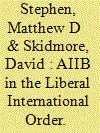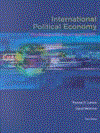| Srl | Item |
| 1 |
ID:
170417


|
|
|
|
|
| Summary/Abstract |
The rise of China raises fundamental questions about the future of the liberal international order (LIO) at a time when it is under ever more strain. Although China’s focus for some years was on joining and participating in existing multilateral institutions, today China is increasingly building its own. Prominent among them is the Asian Infrastructure Investment Bank (AIIB), launched in late 2014. Against the background of contending theoretical expectations, this article examines the extent to which the AIIB either reinforces or challenges the LIO and highlights what this tells us about China’s broader relationship with the LIO. We provide a definition of the LIO that is based on its social purpose rather than on its formal characteristics. State-centric approaches offer insights into China’s decision to engage in new institution building via the AIIB, but we argue that a focus on social purpose is necessary to assess the AIIB’s broader implications for the LIO. We find that, while conforming in large measure to existing institutional models, the AIIB promotes China’s integration into global social networks, strengthens state-led development pathways, and is associated with the Chinese norm of non-interference. The AIIB, thus, foreshadows the possibility of an institutionalised international order indifferent to liberalism. In sum, the AIIB reflects the tensions between the socialising effects of the LIO and China’s growing externalisation of its own non-liberal, state-led model of political economy.
|
|
|
|
|
|
|
|
|
|
|
|
|
|
|
|
| 2 |
ID:
156788


|
|
|
|
|
| Publication |
New York, Routledge, 2017.
|
| Description |
xiii, 522p.pbk
|
| Standard Number |
9780415829618
|
|
|
|
|
|
|
|
|
|
|
|
Copies: C:1/I:0,R:0,Q:0
Circulation
| Accession# | Call# | Current Location | Status | Policy | Location |
| 059251 | 337/LAI 059251 | Main | On Shelf | General | |
|
|
|
|
| 3 |
ID:
113743


|
|
|
|
|
| Publication |
2012.
|
| Summary/Abstract |
Expectations that the presidential transition from George W. Bush to Barack Obama would produce a multilateralist turn in American foreign policy have thus far proven misplaced. This is largely because the strategic environment of the post-Cold War era places structural constraints on the ability of any US president, of whatever ideological leanings, to pursue a consistently multilateralist foreign policy. Internationally, the absence of a shared great power threat has undermined the institutional bargain between the United States and allied states, thus rendering the terms of multilateral cooperation more difficult to agree upon. At home, the end of the Cold War has undermined presidential authority and empowered veto players whose interests are threatened by multilateral commitments. Nevertheless, structure is not destiny. Understanding the sources of political constraint can suggest strategies for overcoming or bypassing such obstacles to multilateral engagement in US foreign policy. A president who wishes to exercise multilateral leadership abroad must seek to renegotiate the terms of US engagement with international institutions while fashioning a compelling rationale that mobilizes public support at home.
|
|
|
|
|
|
|
|
|
|
|
|
|
|
|
|
| 4 |
ID:
065291


|
|
|